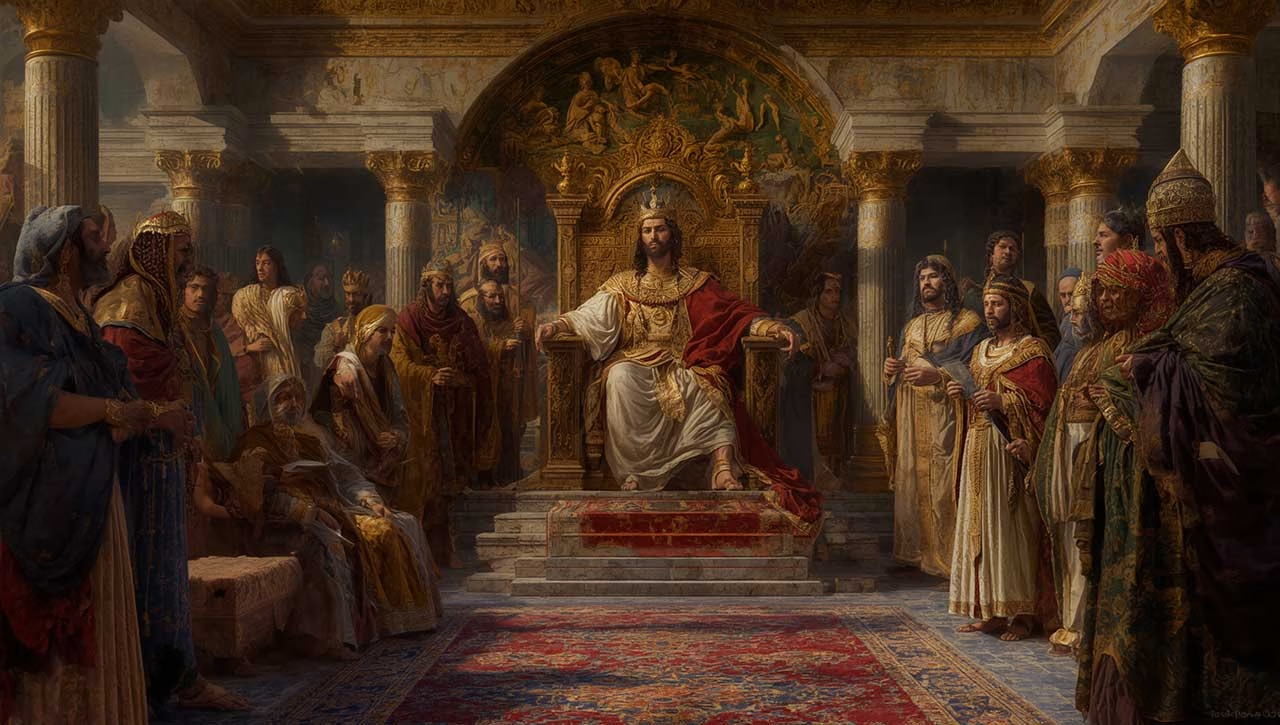
Table of Contents
Introduction: When the Shadows Lengthen
We have all walked into seasons where the world as we know it feels consumed by shadow—where it seems that evil men sit at the council table, where laws are written behind closed doors, and where the righteous are outmaneuvered. In such moments, the ancient question returns: Is God absent where conspiracies thrive?
Esther chapter 3 is a kind of storm warning as much as a history lesson. Its paragraphs carry the ache of loss, of humiliation, and of lives sold for silver by rulers chasing shadows. Yet, if we listen closely to the cadence of the narrative, we will find not the silence of God, but the slow, deep music of His providence—His guiding hand weaving redemption out of plots and accidents, His unseen wisdom guiding the story to hope when all seems lost.
This is not a chapter of miracles, not outwardly. Here, God’s name is never written, but His fingerprints touch every thread. It’s a chapter for anyone living downstream of defeat or in the stranglehold of bureaucratic evil. It is hope for trusting souls in uncertain times. In this study, we will walk through the corridors of Shushan and the weary hearts of the faithful—discovering God’s hidden purposes when conspiracy and fear shake our resolve.
To see the foundation of God’s hidden hand in Esther’s life, revisit our in-depth meditation on Esther 2.
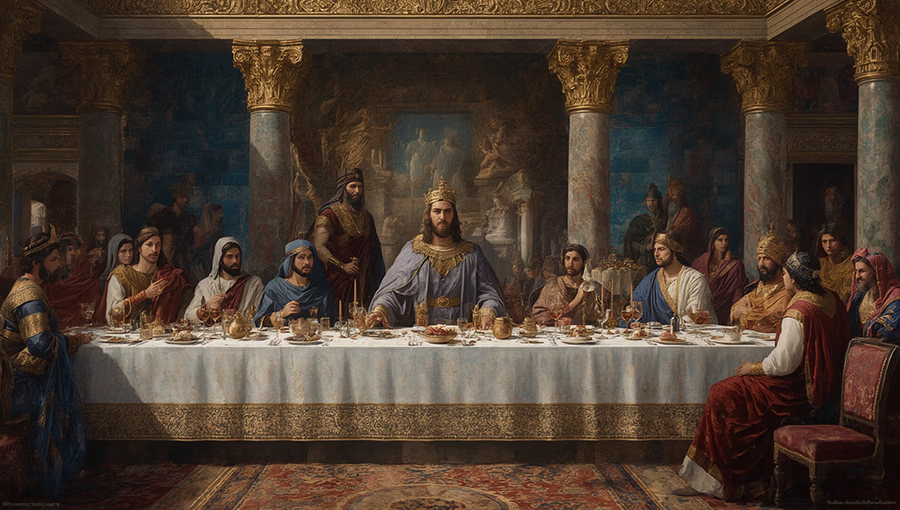
The Ruins of Glory: Shushan’s Humiliated King
If you journey back to where this story roots itself, the soil is full of loss. King Ahasuerus—Xerxes I—was a man raised for power, praised as semi-divine by his people. He gathered the might of 127 provinces, summoned the world to a festival of his own grandeur, and promised to bring Greece to its knees. But wars are honest calculators: for all his gold and dreams, Xerxes is routed, outmaneuvered, and his armies chased home in disgrace. No royal proclamation can heal a king who is now a laughingstock, his tale whispered in ridicule across empires.
How does a broken man govern? Mostly he does not. He seeks forgetfulness, filling his nights with drink and distraction. The real business of empire is left to those with shrewdness and patience—to the “deep state” of advisers, officials, and ambitious climbers who know how to keep the king content while siphoning power. In this court, the wine flows, the laws are but paper, and justice is, as so often, for sale to the highest bidder.
“There is nothing new under the sun.” (Ecclesiastes 1:9)
Such is the world described as Esther chapter 3 unfurls. We have inherited many names for this kind of city—the swamp, the machine, the shadow government. Shushan stands as a biblical archetype for every age where leadership fails and corruption multiplies. For deeper reflection on how such times repeat, visit our Today’s Concerns archive.
What does faith look like here? How do those who trust God’s promises walk upright in a world where uprightness is punished and compromise is the only currency? It is no small comfort to know that Scripture does not turn its eyes from these questions. Instead, it sets us down in their midst and asks us to watch, to wait, and to trust that what seems invisible is no less real than what parades in gold and marble halls.
The Ascent of Haman: Ancient Grudges, New Risks
In the aftershock of defeat and drunkenness, a vacuum forms—and vacuums never remain. Into this gap steps Haman, a man as crafty as he is hungry for power. The text lingers on a detail: Haman is “the Agagite,” son of Hamadatha, the latest scion of a blood feud that began a thousand years before. To grasp the meaning, we must stand with Moses on a crag outside Rephidim, arms outstretched over the battle against the Amalekites (Exodus 17:8–16). It was Amalek who first attacked Israel’s children and stragglers in the wilderness, waging war on the most vulnerable.
God’s response was uncompromising: the Amalekites would be blotted out for what they had done, and Israel was warned to leave no remnant. But history, and more often human disobedience, is seldom so absolute. From Joshua’s campaigns to the troubled days of Saul, slivers of Amalek survived—most notably in King Agag, whom Saul spared, seeking favor rather than fidelity. This decision would haunt Israel for centuries, becoming a teaching on the danger of incomplete obedience.
For insight into the cost of disobedience, and lessons for our daily choices, study our Proverbs meditations.
That is the grudge carried forward by Haman. He appears not only as a political threat, but as an embodiment of generational animosity. His anger, stoked by centuries of memory, becomes the fuel for the conspiracy unfolding in these pages. Hatred, passed on rather than put down, will always find new opportunities to rear its head. In our own day, when national wounds fester and bitterness is nursed rather than confessed, we do well to mark this lesson.
One Unbowed Man: Mordecai at the King’s Gate
In the swirl of new decrees and shifting power, a single act of quiet defiance changes everything. All the king’s servants are commanded to bow before Haman, the new prime minister. With a gesture meant as both respect and homage, the regime cements Haman’s authority. Everyone complies—except Mordecai.
The portrait of Mordecai is one of restrained dignity. Adoptive father to Esther, himself a man of exile, Mordecai is no troublemaker. Yet in the face of the command to bow, he refuses. The Bible says simply, “I am a Jew.” That identity, deeply formed by a covenant with a God who delivered slaves from Pharaoh, permits no compromise in worship. The first commandment is front and center: No other gods, no honor given to men as if they were divine.
For the servants at the gate, Mordecai’s decision is inexplicable, even reckless. “Why do you transgress the king’s command?” they whisper, alarmed at the risk he takes. Their preoccupation with safety, advancement, and favor is typical of every bureaucracy. We recognize this spirit—how quiet acts of faith can make the majority uncomfortable, and how gossip races through bureaucratic corridors, seeking to remove the threat rather than solve the problem.
For a meditative guide to spiritual backbone in a politicized world, see Five Smooth Stones and Cultural Discernment in Today’s Concerns.
This moment matters because the future hangs on such moments. Obedience is costly and almost always misunderstood. Today’s acts of conviction, so easily ridiculed by the crowd, become the first stones in the path of salvation.
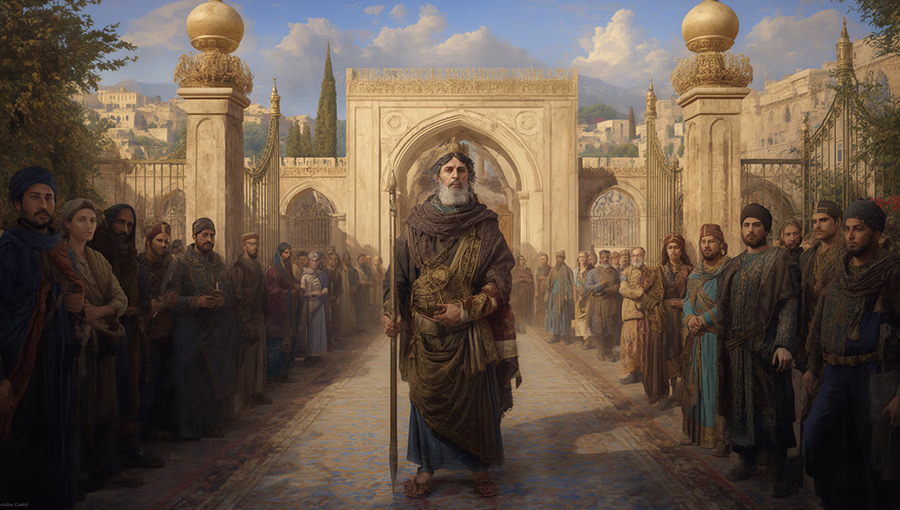
The Spiral of Pride: Haman’s Wrath Ignited
There is nothing so thin-skinned as pride. The entire kingdom may kneel, thousands may flatter, but if one head remains unbowed, pride festers and demands blood. So it is with Haman. The text describes his indignation not just as personal, but as all-consuming: “Haman was filled with wrath.” Yet, as is so often the case with the corrupt, he will not be satisfied to strike one man. Instead, his ego grows monstrous, and Haman seeks to destroy the whole people Mordecai represents.
Here, the narrative edges from dislike to disaster. What was once a test of worship becomes, through the alchemy of pride and opportunity, a plan for genocide. Haman’s hatred, inflated by position and streamlined by bureaucracy, now targets every Jew throughout the empire. In a single generation, the unfinished business of Amalek is reborn as a bureaucratic decree. The story is not ancient; it is urgent, recalling for us how quickly evil can dress itself in the trappings of law, legitimacy, and “public good.”
For modern parallels on how law and propaganda can be twisted, visit Qoheleth: Wisdom for Modern Living.
For comprehensive historical context, review Books of the Bible: Esther.
Pride, unbound by God’s wisdom, is relentless; it repays the smallest slight with the largest catastrophe.
Rolling the Dice: Heaven’s Timing in Human Hands
Haman’s plot is cold, methodical. He gathers his associates, casts lots (“purim”) to select the date for the destruction, and moves forward with plans too monstrous for daylight. To the modern mind, casting dice seems quaint, but in the world of Esther, such “chance” events signal something deeper—the intersection of fate and providence.
The selected day, eleven months away, is almost certainly meant by Haman as an act of total confidence: the Jews will not escape, there will be time to prepare, and not even the randomness of dice can reverse the plan. Yet Scripture quietly signals that dice belong not to fate but to God (“The lot is cast into the lap, but its every decision is from the Lord.” Proverbs 16:33). The very means Haman uses for murder will become the festival by which Jews recall their deliverance: Purim.
For further exploration of Purim’s meaning and practice, study My Jewish Learning’s guide and our Books of the Bible teaching.
Thus, what men use as instruments of evil, providence bends for celebration and memory. In our own crises, do we have eyes to see that timing, delay, and apparent “coincidence” may themselves become the scaffolding of deliverance?

Bribery, Bureaucracy, and Betrayal: The Machinery of Evil
No plot of such lethal ambition is complete without the machinery of government. Haman is adept—not only does he plan, he purchases. Ten thousand talents of silver, a fortune by any measure, are offered to King Ahasuerus to fund the extermination. This is not an afterthought but a sign of total confidence in the self-preserving instincts of power. The king, far more concerned with ease than justice, needs little persuasion: “The money and the people are given to you,” he says, handing over his signet ring—his authority, his complicity, sealed and ready.
The king’s ignorance is staggering. He asks no questions—about the people, the cause, or the scale of violence. His only interest is comfort, approval, and his next cup. It is a chilling lesson in the dangers of power wielded without wisdom, of authority divorced from moral compass, of rulers who sign away lives for convenience. The “swamp” of Persian bureaucracy swings into action: scribes are summoned, decrees are written in every language, riders disperse the message to the corners of an empire, all with terrifying bluntness—destroy, kill, and annihilate every Jew, young and old, male and female, in a single day. Their possessions are to be plundered as reward.
The city of Shushan reels. For generations, Jews have lived and contributed to this society, their absence now threatening the fabric of daily life. Why should good neighbors, faithful citizens, be condemned to death overnight? The “why” is never answered, because all such machinery, throughout history, counts on compliance, confusion, and a populace too bewildered to resist.

Patterns in Providence: Lessons Woven through Generations
These events, devastating as they are, do not surprise those who watch for God’s hand. As Chuck Frank’s teaching on biblical pattern recognition reveals, moments of crisis, oppression, and apparent helplessness have a rhythm in the biblical story. Evil flourishes, a bleakness settles on the people, and hope seems extinguished. Yet, this is only the beginning of God’s blueprint.
His next step, seen across the ages, is the raising up of unlikely agents—those whom society discounts, whom the powerful overlook. So it is here: an orphan girl turned queen, an exiled elder at the gate. God’s providence chooses the weak so that His strength may be displayed. The story is never saved by heroes of the world’s making, but by those who find their courage in faithfulness more than in popularity or force.
“But God chose the foolish things of the world to shame the wise; God chose the weak things of the world to shame the strong.” (1 Corinthians 1:27)
This is not an ancient formula, but a living pattern:
- Evil rises and presses its case.
- Hopelessness and oppression threaten the faithful.
- God lifts up a weak or unlikely deliverer.
- The struggle grows fierce and even deadly.
- God brings deliverance, not despite but through the agency of faith and prayer.
For ongoing meditation and examples from today, visit our series on God’s providence in Esther and beyond.
The Shadow of Past Disobedience: Echoes from Amalek
Why did God insist so fiercely that Amalek be destroyed? The answer is found not in divine cruelty, but in divine consequence. When enemies wage war on the helpless, nursing vengeance across generations, their poison infects every layer of society. Saul’s half-hearted obedience—his reluctance to complete God’s command—means a few Amalekites slip away. Among their number, King Agag survives for a time, his line unbroken. Samuel, in one of the Old Testament’s most severe moments, executes Agag himself, swinging the sword reserved for kings.
“To obey is better than sacrifice, and to heed better than the fat of rams.” (1 Samuel 15:22)
Yet, the damage is done. A single act of incomplete faithfulness festers into crisis a thousand years later. Haman is the legacy of that disobedience—the loose thread left dangling, tugged loose in a later generation and threatening to unravel all.
To gain more on unfinished obedience and its cost, see Bible Messages: Faithfulness.
This is a lesson for families and cultures alike. Sins nursed, patterns ignored, “small” compromises—they outlast the ones who shrug them off. Yet, in confession and faithfulness, God still meets us, reshaping generational wounds into opportunities for grace.
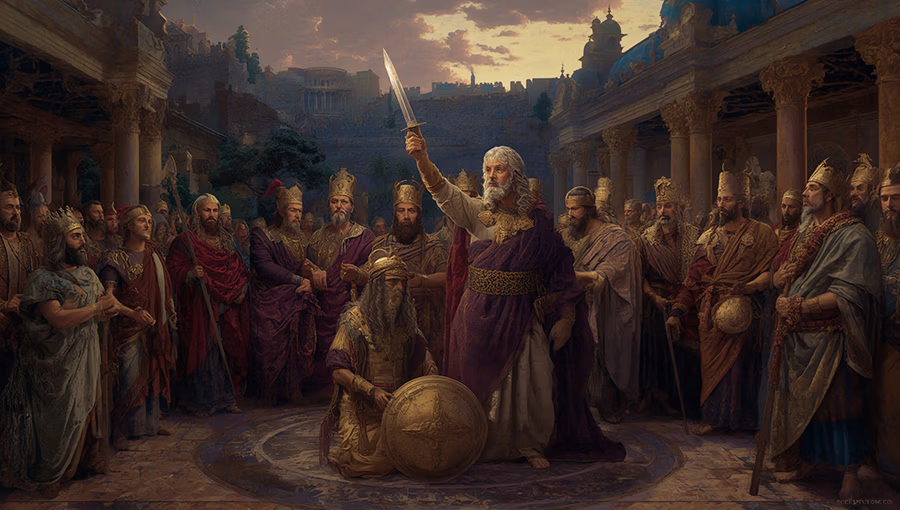
Intercessory Prayer: The Hidden Engine of Deliverance
In the invisible world, as evil plots its next move, the real work of deliverance begins in prayer. Esther, informed of Haman’s plot, does not leap immediately into action. Instead, she calls for fasting and intercession—an act mirrored in the pleas of ancient leaders and echoed across every era where the stakes exceed our strength.
The prayer in times of conspiracy is a prayer of humility: it confesses our dependence, mourns the coming pain, and builds the courage that only God can supply. Intercessory prayer is not a last, desperate resort, but a first act—a declaration that unless the Lord builds the house, those who labor, labor in vain (Psalm 127:1).
In the American experience, we see this mirrored in Robert E. Lee’s plea after the Civil War—a call not for politics first, but for passionate prayer that God might yet heal and return the nation to its best purposes.
“Let prayer be our passion. Let prayer be our practice.”
To request prayer and connect with those who help bear burdens, use the Text GOD confidential prayer line.
Prayer aligns our hearts with providence, makes us honest about our weaknesses, and prepares us for the ordinary acts of courage that, in time, sway history’s course.
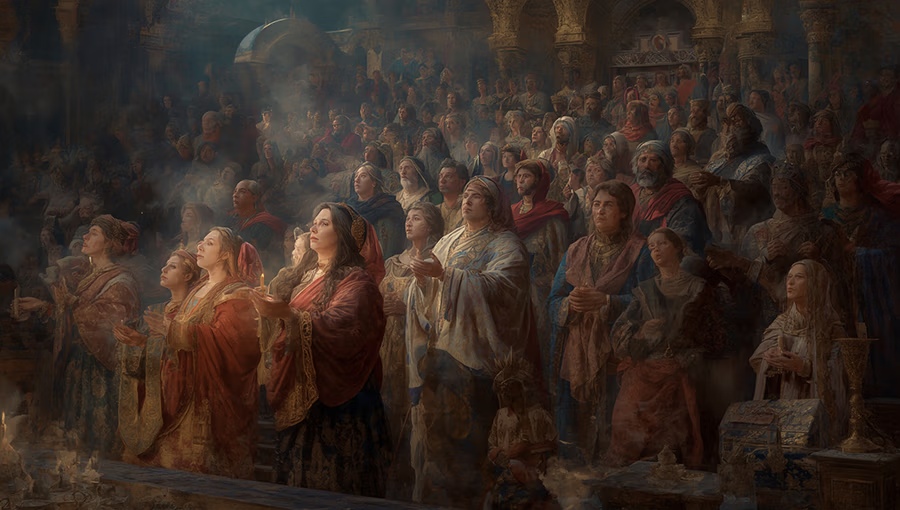
When Evil Organizes: Lessons for Today
As the scrolls go out, as the city pauses in perplexity, as the hammer falls with bureaucratic finality, the question is not only “Why?” but “What now?” Faith does not shrink from naming evil. It does not, either, lapse into fatalism. Throughout the Bible, real faith means holding fast to what is true, even when everyone else bows, and beginning—always beginning—with prayer.
We are called, in every generation, to the same readiness:
- To discern the patterns of evil as it organizes itself: through propaganda, prejudice, and decrees against the faithful.
- To refuse to bow to the idols of our time—whether of power, popularity, or safety.
- To pray, when no other answer is available, for timing and for courage.
- To act with humility, trusting that God writes history in the margins when the headlines would have us despair.
Perhaps your own life right now is lived in chapter 3—a place of confusion, risk, and slow-motion threats. If so, remember: the outcome has yet to be determined, and in the space between decree and deliverance, the prayers and courage of a few may redeem the many.
For wisdom on living faithfully in crisis, explore our Bible Messages and Today’s Concerns resources.
The Reversal Hidden in the Darkness: The Promise of Purim
The decree is issued; the couriers ride out. For months, a cloud hangs over every Jewish household in 127 provinces. Yet, in the slow space before the appointed day, God arranges the pieces for reversal.
History, as told by the faithful, is always more than what we can calculate. The very date set for destruction becomes the date of celebration. The lot meant for murder gives its name to a feast of joy and generosity—Purim. Generations remember, not only the terror avoided, but the faithfulness of God in turning tables against the proud and protecting the humbly obedient.
There is no place so lost that God cannot build a festival there; no decree so final that He cannot insert an “until.” The Purim of our own lives comes, not with fanfare, but with silent rescue—grace in place of despair, courage in place of conformity, memory in place of fear. As we celebrate, we remember that nothing—no law, no king, no conspiracy—can overturn the hidden plans of the true Sovereign.
For meditations on celebration and memory, visit Books of the Bible: Esther.
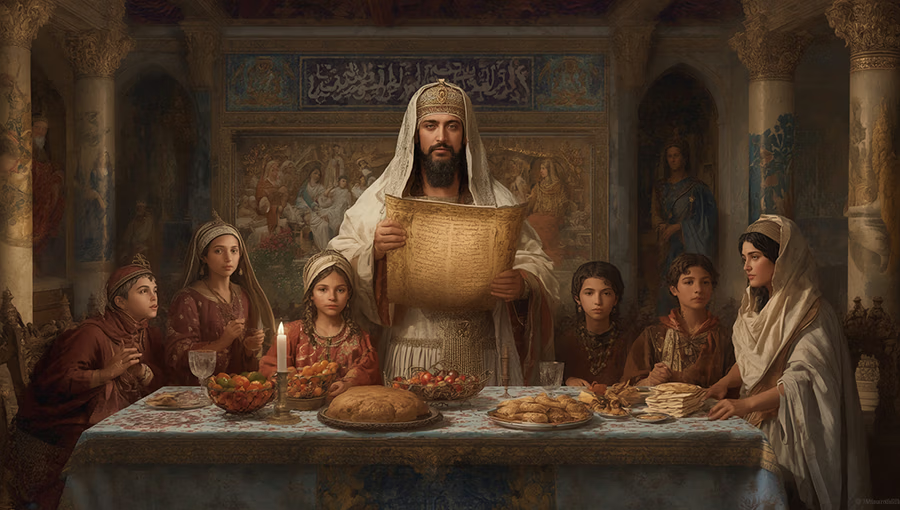
Providence Over Panic: Walking Faithfully in Our Day
Stepping back, we see that Esther chapter 3 is not primarily a drama of willpower, but of trust and obedience when the path is dark. It offers the honest comfort that God does not require perfect circumstances; that, in the noise and manipulation of “swamp” politics, His hand still directs. It instructs us not to panic, not to trade in hope, not to shrink from faithfulness when the systems and stories of the age seem against us.
Our responsibility is not to engineer outcomes, but to occupy the gate as Mordecai did, to pray in fasting as Esther did, to speak truth as Samuel did, and—above all—to wait for the “but God” moment that those who trust and obey have always known.
For a toolkit of practices to resist despair and live in quiet expectancy, study G‑Dash encouragements and The 4-3 Formula.
It is not bombast but perseverance—small acts of obedience—that God most delights in and through which He most reliably works.
Reflection: The Legacy of Believing Communities
The beauty of this chapter, and of all history written in God’s script, is its invitation to remember. Jews everywhere gather on Purim to recall how a single act of faith, a season of prayer, and invisible providence rewrote a day of suffering as a day of festivity.
For Christians, it is a reminder that the threats we face—however real—do not have the last word. Our calling is first to faithfulness, then to courage, then to remembrance.
For collective reflection and community encouragement, join the Christian Community page.
When times are dark, tread slowly and trust deeply. The same hand that guided Esther and Mordecai pens the lines of your story, too.
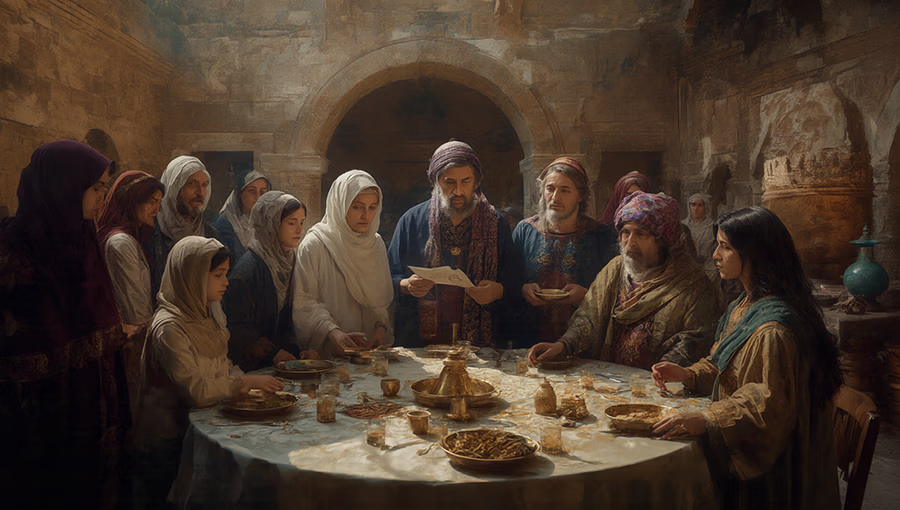
Frequently Asked Questions (FAQs)
Why does God allow conspiracies like Haman’s to threaten His people?
God uses such moments, not because He delights in evil, but to reveal His sovereignty and to invite His people into deeper dependence and faith. As seen in Esther, what is meant for harm is often the trigger for revival and a new chapter of deliverance. For further meditations, see our Book of Esther series.
How can I “stand firm like Mordecai” when no one else will?
Cultivate a daily practice of prayer, scriptural reading, and small acts of obedience. Seek community with those who strengthen your faith and learn to see courage not as bravado but as persistent faithfulness. Explore the Five Smooth Stones principles.
What is the spiritual importance of Purim for Christians, not just Jews?
Purim teaches all believers to celebrate reversals and to trust in God’s power to deliver. It’s about faithful remembrance—retelling how God turns mourning to joy for those who trust Him. Study more in Books of the Bible.
Does prayer make a difference in national or personal crises?
Scripture and history both affirm the power of united, humble intercession to change outcomes, bring comfort, and align communities with God’s redemptive work. Engage personally in prayer through Text GOD.
Further Reading (External Links):
- Esther 3 Commentary—Enduring Word – Trusted exposition of the chapter.
- Haman the Agagite—WisdomLib – Historical lineage and hostility.
- Purim 101—My Jewish Learning – Cultural and religious background.
- Xerxes: Archaeological Perspective – Evidence and context for the Persian setting.
- Robert E. Lee’s Day of Prayer – Prayer through national trial.
- Timeline: Persian Empire—World History – Chronological anchoring for deeper study.

